| Listing 1 - 10 of 11 | << page >> |
Sort by
|
Book
ISBN: 9780905205564 0905205561 Year: 2014 Volume: 52
Abstract | Keywords | Export | Availability | Bookmark
 Loading...
Loading...Choose an application
- Reference Manager
- EndNote
- RefWorks (Direct export to RefWorks)
Laudatory poetry, Greek. --- Olympic games (Ancient) --- Athletics --- Games --- Mythology, Greek --- Pindar --- Criticism and interpretation. --- Laudatory poetry, Greek --- Criticism and interpretation --- Poetry --- Olympic games (Ancient) - Poetry --- Athletics - Greece - Poetry --- Games - Greece - Poetry --- Mythology, Greek - Poetry --- Pindar - Criticism and interpretation
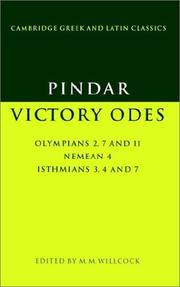
ISBN: 0521430550 0521436362 9780521436366 Year: 1995 Publisher: Cambridge Cambridge University press
Abstract | Keywords | Export | Availability | Bookmark
 Loading...
Loading...Choose an application
- Reference Manager
- EndNote
- RefWorks (Direct export to RefWorks)
Heroes --- Mythology, Greek --- Héros --- Mythologie grecque --- Poetry --- Poésie --- Olympic games (Ancient) --- Athletics --- Games --- Odes, Greek. --- Pindare, --- Héros --- Poésie --- Poetry. --- Odes, Greek --- Greek odes --- Greek poetry --- Olympic games (Ancient) - Poetry. --- Athletics - Greece - Poetry --- Games - Greece - Poetry --- Mythology, Greek - Poetry
Book
ISBN: 2951775911 9782951775916 Year: 2004 Publisher: Paris : Calepinus,
Abstract | Keywords | Export | Availability | Bookmark
 Loading...
Loading...Choose an application
- Reference Manager
- EndNote
- RefWorks (Direct export to RefWorks)
Laudatory poetry, Greek --- Olympic games (Ancient) --- Athletics --- Games --- Translations into French. --- Poetry --- Pindar --- Laudatory poetry, Greek - Translations into French. --- Olympic games (Ancient) - Poetry. --- Athletics - Greece - Poetry --- Games - Greece - Poetry
Book
ISBN: 9782251240015 2251240012 Year: 2014 Volume: 1 Publisher: Paris: Les Belles Lettres,
Abstract | Keywords | Export | Availability | Bookmark
 Loading...
Loading...Choose an application
- Reference Manager
- EndNote
- RefWorks (Direct export to RefWorks)
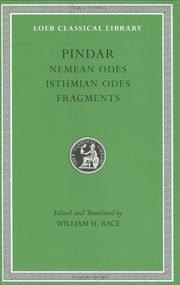
ISBN: 0674995341 9780674995345 Year: 1997 Volume: 485 Publisher: Cambridge Harvard University Press
Abstract | Keywords | Export | Availability | Bookmark
 Loading...
Loading...Choose an application
- Reference Manager
- EndNote
- RefWorks (Direct export to RefWorks)
Of the Greek lyric poets, Pindar (ca. 518-438 BCE) was "by far the greatest for the magnificence of his inspiration" in Quintilian's view; Horace judged him "sure to win Apollo's laurels." The esteem of the ancients may help explain why a good portion of his work was carefully preserved. Most of the Greek lyric poets come down to us only in bits and pieces, but nearly a quarter of Pindar's poems survive complete. William H. Race now brings us, in two volumes, a new edition and translation of the four books of victory odes, along with surviving fragments of Pindar's other poems. Like Simonides and Bacchylides, Pindar wrote elaborate odes in honor of prize-winning athletes for public performance by singers, dancers, and musicians. His forty-five victory odes celebrate triumphs in athletic contests at the four great Panhellenic festivals: the Olympic, Pythian (at Delphi), Nemean, and Isthmian games. In these complex poems, Pindar commemorates the achievement of athletes and powerful rulers against the backdrop of divine favor, human failure, heroic legend, and the moral ideals of aristocratic Greek society. Readers have long savored them for their rich poetic language and imagery, moral maxims, and vivid portrayals of sacred myths. Race provides brief introductions to each ode and full explanatory footnotes, offering the reader invaluable guidance to these often difficult poems. His new Loeb Classical Library edition of Pindar also contains a helpfully annotated edition and translation of significant fragments, including hymns, paeans, dithyrambs, maiden songs, and dirges.
Athletics --- Games --- Laudatory poetry, Greek --- Olympic games (Ancient) --- Poetry. --- Translations into English. --- Poetry --- Laudatory poetry, Greek - Translations into English --- Olympic games (Ancient) - Poetry. --- Athletics - Greece - Poetry. --- Games - Greece - Poetry.
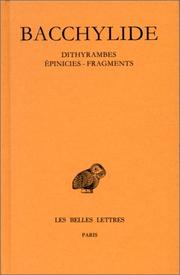
ISBN: 2251004300 9782251004303 Year: 1993 Volume: 355 Publisher: Paris : Les Belles Lettres,
Abstract | Keywords | Export | Availability | Bookmark
 Loading...
Loading...Choose an application
- Reference Manager
- EndNote
- RefWorks (Direct export to RefWorks)
Classical Greek literature --- Athletics --- Games --- Laudatory poetry, Greek --- Odes --- Lyric poetry --- Poetry --- Greek laudatory poetry --- Greek poetry --- Translations into French --- Bacchylides --- Bacchylide --- Bakchylides --- Bakchulides --- Translations into French. --- Poetry. --- Vakchylidēs --- Bacchilide --- Bακχυλíδης --- Laudatory poetry, Greek - Translations into French --- Odes - Translations into French --- Athletics - Greece - Poetry --- Games - Greece - Poetry
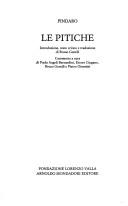
ISBN: 9788804391432 880439143X Year: 2000 Publisher: Milano Mondadori
Abstract | Keywords | Export | Availability | Bookmark
 Loading...
Loading...Choose an application
- Reference Manager
- EndNote
- RefWorks (Direct export to RefWorks)
Games --- Athletics --- Mythology, Greek --- Laudatory poetry, Greek --- Poetry --- Laudatory poetry, Greek. --- Poésie élogieuse grecque --- Sports athlétiques --- Jeux --- Translations into Italian. --- Poetry. --- Poésie --- Pindar --- Translations into Italian --- Greek laudatory poetry --- Greek poetry --- Pindarus --- Pindare --- Pindaro --- Πίνδαρος --- Pindaros --- Games - Greece - Poetry --- Athletics - Greece - Poetry --- Mythology, Greek - Poetry --- Laudatory poetry, Greek - Translations into Italian --- Pindar - Translations into Italian
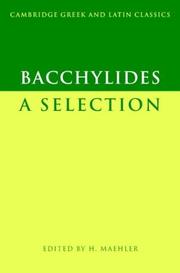
ISBN: 0521599776 0521590361 0511802382 9780521599771 Year: 2004 Volume: *14 Publisher: Cambridge : Cambridge University Press,
Abstract | Keywords | Export | Availability | Bookmark
 Loading...
Loading...Choose an application
- Reference Manager
- EndNote
- RefWorks (Direct export to RefWorks)
Bacchylides (c. 520-450 BC) was one of the nine Greek lyric poets selected as models of this genre by the Alexandrian scholars who first collected and edited their songs in the 3rd century BC. Bacchylides' songs did not survive the end of antiquity, but substantial portions of at least three books have been recovered from papyri found in Egypt. This 2004 book was the first commentary in English since R. C. Jebb's Bacchylides (1905). It aims to introduce the reader to two important areas of Greek choral lyric poetry in which Bacchylides was pre-eminent: songs in praise of individuals (victory odes 3-6 and 11, and enkomia frr. 20A-D), and songs composed for religious festivals (dithyrambs, procession songs, and paeans). Among the most attractive features of his style are the well-balanced formal structure of his poems, and his vivid narrative which is capable of creating scenes of high drama and deep passion.
Laudatory poetry [Greek ] --- Lofdicht [Grieks ] --- Poésie élogieuse grecque --- Athletics --- Athletes --- Mythology, Greek --- Games --- Laudatory poetry, Greek. --- Sports athlétiques --- Sportifs --- Mythologie grecque --- Jeux --- Poetry. --- Poésie --- Poetry --- Sports athlétiques --- Poésie élogieuse grecque --- Poésie --- Laudatory poetry, Greek --- Greek laudatory poetry --- Greek poetry --- Sports persons --- Sportspeople --- Sportspersons --- Sports personnel --- Greece --- Mythology [Greek ] --- Arts and Humanities --- History --- Athletics - Greece - Poetry --- Athletes - Greece - Poetry --- Mythology, Greek - Poetry --- Games - Greece - Poetry --- Athlétisme --- Athlètes --- Mythologie --- Jeux publics grecs --- Jeux olympiques antiques --- Grèce
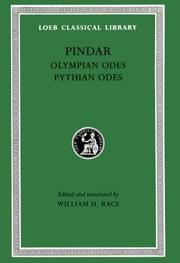
ISBN: 0674995643 9780674995642 Volume: 56, 485 Publisher: Cambridge (Mass.) Harvard university press
Abstract | Keywords | Export | Availability | Bookmark
 Loading...
Loading...Choose an application
- Reference Manager
- EndNote
- RefWorks (Direct export to RefWorks)
Of the Greek lyric poets, Pindar (ca. 518-438 BCE) was "by far the greatest for the magnificence of his inspiration" in Quintilian's view; Horace judged him "sure to win Apollo's laurels." The esteem of the ancients may help explain why a good portion of his work was carefully preserved. Most of the Greek lyric poets come down to us only in bits and pieces, but nearly a quarter of Pindar's poems survive complete. William H. Race now brings us, in two volumes, a new edition and translation of the four books of victory odes, along with surviving fragments of Pindar's other poems. Like Simonides and Bacchylides, Pindar wrote elaborate odes in honor of prize-winning athletes for public performance by singers, dancers, and musicians. His forty-five victory odes celebrate triumphs in athletic contests at the four great Panhellenic festivals: the Olympic, Pythian (at Delphi), Nemean, and Isthmian games. In these complex poems, Pindar commemorates the achievement of athletes and powerful rulers against the backdrop of divine favor, human failure, heroic legend, and the moral ideals of aristocratic Greek society. Readers have long savored them for their rich poetic language and imagery, moral maxims, and vivid portrayals of sacred myths.Race provides brief introductions to each ode and full explanatory footnotes, offering the reader invaluable guidance to these often difficult poems. His new Loeb Classical Library edition of Pindar also contains a helpfully annotated edition and translation of significant fragments, including hymns, paeans, dithyrambs, maiden songs, and dirges.
Athletics --- Games --- Laudatory poetry, Greek --- Jeux --- Sports athlétiques --- Poésie élogieuse grecque --- Poetry --- Translations into English --- Poésie --- Traductions anglaises --- Pindar --- Traductions en anglais --- Olympic games (Ancient) --- Poetry. --- -Games --- -Laudatory poetry, Greek --- -Olympic games (Ancient) --- Ancient Olympic games --- Olympics --- Greek laudatory poetry --- Greek poetry --- Children --- Children's games --- Games, Primitive --- Games for children --- Pastimes --- Primitive games --- Recreations --- Entertaining --- Physical education and training --- Amusements --- Play --- Sports --- Recreation --- -Pindarus --- Pindare --- Pindaro --- Πίνδαρος --- -Translations into English --- -Pindar --- Píndaro --- Pindaros --- Pindarus --- Translations into English. --- Sports athlétiques --- Poésie élogieuse grecque --- Poésie --- Laudatory poetry, Greek - Translations into English --- Olympic games (Ancient) - Poetry. --- Athletics - Greece - Poetry. --- Games - Greece - Poetry.
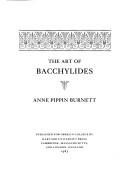
ISBN: 0674046668 9780674046665 Year: 1985 Volume: v. 29 Publisher: Cambridge (Mass.): Harvard university press
Abstract | Keywords | Export | Availability | Bookmark
 Loading...
Loading...Choose an application
- Reference Manager
- EndNote
- RefWorks (Direct export to RefWorks)
Odes --- History and criticism --- Histoire et critique --- Bacchylides --- Criticism and interpretation --- Translations, English --- Laudatory poetry, Greek --- Odes, Greek --- Athletics --- Games --- -Athletics --- -Games --- -Laudatory poetry, Greek --- -Greek laudatory poetry --- Greek poetry --- Children --- Children's games --- Games, Primitive --- Games for children --- Pastimes --- Primitive games --- Recreations --- Entertaining --- Physical education and training --- Amusements --- Play --- Sports --- Lyric poetry --- Poetry --- Translations into English --- Recreation --- -Bacchylides --- -Bakchylides --- Vakchylidēs --- Bacchylide --- Bacchilide --- Bακχυλíδης --- History and criticism. --- Criticism and interpretation. --- -History and criticism --- -Criticism and interpretation --- -Bacchylide --- Bakchylides --- Bakchulides --- Greek odes --- Laudatory poetry, Greek - Translations into English --- Laudatory poetry, Greek - History and criticism --- Odes, Greek - History and criticism --- Athletics - Greece - Poetry --- Games - Greece - Poetry --- Bacchylides - Criticism and interpretation --- Bacchylides - Translations into English --- Translations, English.
| Listing 1 - 10 of 11 | << page >> |
Sort by
|

 Search
Search Feedback
Feedback About
About Help
Help News
News